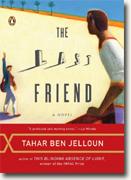The Last Friend
Tahar Ben Jelloun
book reviews:
· general fiction
· chick lit/romance
· sci-fi/fantasy
· graphic novels
· nonfiction
· audio books
· author interviews
· children's books @
curledupkids.com
· DVD reviews @
curledupdvd.com
newsletter
win books
buy online
links
home
for authors
& publishers
for reviewers

 |
The Last Friend Tahar Ben Jelloun Penguin Paperback 192 pages January 2007 |
|
At one-hundred-eighty-two pages, The Last Friend
Within this framework, the plot traces how two adoloscent boys, equally obsessed with sex and politics, grow up to become a doctor and a professor, strong family men. In between, they visit brothels, flirt with Communism, go off to college in France and Canada, are arrested by the Moroccan government, and are conscripted into the army. Once they become adults, the plot focuses on how Ali and Mamed adjust to changes in their lives, primarily their marriages and Mamed's move to Sweden. The neatest part of this book is seeing the same relationship through two very different sets of eyes. The reader also gets to 'meet' each character twice - once in first-person form, with access to all of his thoughts and emotions, and then again in third person, through the eyes of another. Jelloun masterfully shows how people, even close friends, can misinterpret one another. He also shows how subjective reality is; between the two accounts, the reader is left to try to determine which is more 'real'. The writing style is quite straightforward: there are no metaphors or fancy flourishes. This feels intentional; Jelloun wanted Ali and Mamed's stories to feel like normal people, and normal people tend to write simply. The point of this book is the story, not the language. While the main characters feel like real people, the supporting characters fall rather flat. Although both men are married with children, the reader never really discovers anything about the wives. They feel like cardboard cutouts, and the only emotion the men ever find in their wives is jealousy. Perhaps this was intentional. After all, this book is about how a person's perceptions shape and indeed limit the world around them. Perhaps Jelloun meant to show that neither Ali nor Mamed truly connected to their wives, since they were both too attached to their own friendship. However, it does limit the emotional investment the reader has in the book. The other drawback to Jelloun's chosen style is that the reader does not discover Morocco. Most of the book is set in Tangiers, and both Ali and Mamed profess a strong emotional attachment to the city. Unfortunately, this attachment does not require extensive description, so this is not the kind of fiction that makes a reader feel like she's gone on a vacation. There are a few shining moments when Mamed, now in Sweden, descibes his longing for his homeland: "It's crazy, but the things I missed most were things that had perviously bothered me: the noise of the cars, the shouting of the street merchants, the technicians who messed around trying to fix elevators without admitting they knew nothing about them, the cheese, the old peasant ladies who sold vegetables from their own gardens."Passages like those show Jelloun's descriptive powers. If Jelloun had exercised them more, the reader could bceome more at home in Tangiers. Despite these concerns, The Last Friend Originally published on Curled Up With A Good Book at www.curledup.com. © Eva Kay, 2007 |
|
|
|
 Click here to learn more about this month's sponsor! |
|
| fiction · sf/f · comic books · nonfiction · audio newsletter · free book contest · buy books online review index · links · · authors & publishers reviewers |
|
| site by ELBO Computing Resources, Inc. | |
